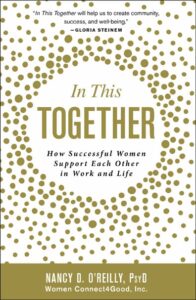
It’s a fact that many men want to support women at work, stamp out sexism and help women advance. However, they may not be aware that the way they go about it may do more harm than good. David M. Mayer writes in Harvard Business Review that a well-meaning man, even one who defends a woman’s ideas or work, can unintentionally undermine her. Whether these men realize it or not, their behavior isn’t helpful, but instead is a form of benevolent sexism.
Psychologists Peter Glick and Susan Fisk define benevolent sexism as a chivalrous attitude that suggests women are weak and need men’s protection. While that may not seem like a bad thing on the surface, Glick and Fisk find, “This kind of paternalism suggest that women need to be taken care of by men, and men who endorse this form of benevolent sexism are more likely to accept the mistreatment and harassment of women at work.”
Comments that describe women as more compassionate, nurturing, neater, or kinder than men are stereotypical, and can be misconstrued. Mayer points out, “Research demonstrates that such ‘compliments’ create a double bind for women: If women are viewed as nice, they are far less likely to be deemed competent.”
Research has found benevolent sexism reduces the chances of getting candid feedback or a shot at the challenging or hot assignments. Instead women get unwanted assistance and confidence-eroding offers. This ties directly into the unintended harmful effects of benevolent sexism that we write about in the new book, In This Together. “Directing women into public relations because they are great communicators puts them at a corporate dead end. Women who are gracious and welcoming get saddled with organizing all the office events. Women who are intuitive and connect well with others are expected to manage the office’s emotional housework, including relational aggression among other women. Finally, men who refuse to travel for business with women prevent them from advancing higher in sales or management.”
A poll by Pew Research Center suggests that more than half of men think sexism is a thing of the past. When looking at issues like benevolent sexism, it’s easy to see why only about one-third of women agree. Yes, sexism is still a problem, and until we shine a light on the issue and communicate it to our peers, it will continue to hold women back.
Recruiting Men as Allies
Men: Ask the women at work to tell you about their experiences and listen to them when they talk. Don’t try to interpret their experience for them or tell them “what they ought to do.”
Women: Don’t assume that anyone, especially men, will understand what it’s like to walk in your shoes unless you teach them what it’s like to be a woman in your workplace. We need to recruit men to the cause of equality and talk about the issues. We are truly “in this together,” and it’s a mistake to limit our support networks exclusively to women. Gender equality is a big umbrella that includes and benefits men too.
Who are the men in your workplace who meet the criteria for allies? Look for a man who:
- Can turn his good intentions into lasting change if women will tell him truthfully and openly the ways gender inequality has affected them
- Shows through his words and actions that he is committed to gender equality
- Is willing to have the difficult conversations on your behalf when you’re not in the room
- Offers to mentor and sponsor women to create opportunities for female leadership within your company
Once you identify such a man, ask for his help and expect and believe that he will help you. Communicate with your ally about your needs and goals. Discuss biases, assumptions, and oppressive patterns of behavior that you observe at work. Think together strategically about how to address any issues that inhibit your ability to do your work, achieve your goals, and thrive in your relationships with your coworkers. Ultimately, opening communication about these issues enables women and their allies to develop positive working relationships based on shared values. Communication will also create opportunities for collaboration among peers. From the outset women and their allies can agree to work together, share in the rewards of success, and give credit where credit is due.
Problems like benevolent sexism didn’t arrive overnight, and they won’t disappear right away either. However, if we work together, women and men, to identify and eradicate the problem, we truly can gain full equality in work and life.
Order Dr. Nancy’s new book today!
 Dealing with sexism and cultivating men as allies are just a couple of the issues covered in Dr. Nancy’s new book, In This Together: How Successful Women Support Each Other In Work and Life, along with thoughts, inspiration, and stories from 40 successful women.
Dealing with sexism and cultivating men as allies are just a couple of the issues covered in Dr. Nancy’s new book, In This Together: How Successful Women Support Each Other In Work and Life, along with thoughts, inspiration, and stories from 40 successful women.
Order your copy – and gifts for your friends today!

